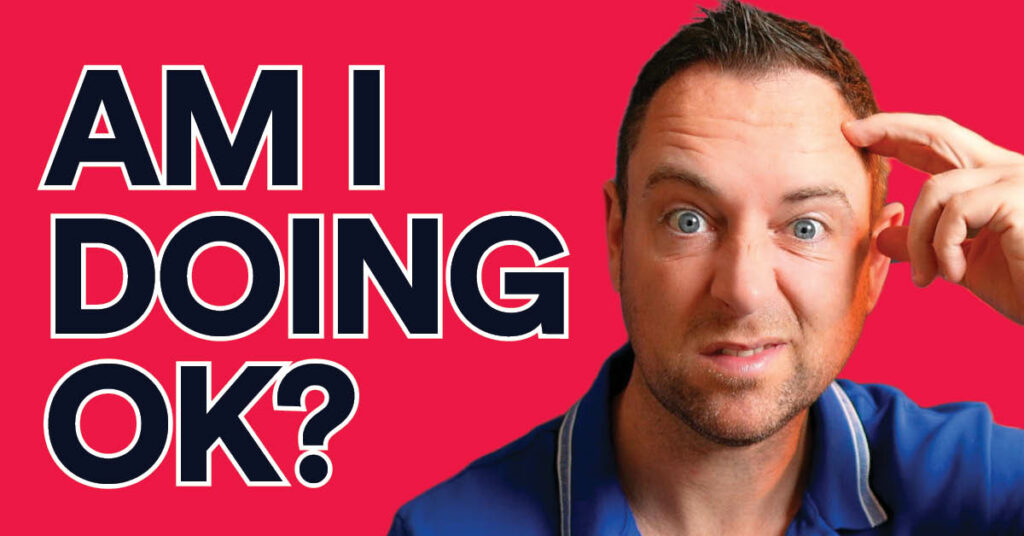I’ll be honest with you. Most of us, even many wealthy people I’ve spoken to, don’t think they’re doing well financially. No matter how big their income is, or how much money they’ve made, many believe they are anything but financially well off.
You probably have these thoughts too and they get worse when you start comparing yourself to your peers. There will always be someone richer, someone, who has nicer things and you know what, they’re probably better looking as well.
The mental jockeying for position in life is happening inside our heads. It’s happening inside everyones. We’re all thinking the same thoughts and we all have similar insecurities and worries because people rarely feel they have enough and of course, it’s hard to break away from such feelings.
And this insecurity is compounded when you open up Instagram or tik tok. Honestly, I’ve never seen so many 20-year-old billionaire business and lifestyle gurus, driving G Wagons or Ferraris in Dubai. Understanding that most of it is fake and the rest of it is greatly exaggerated helps….a little. But our expectations are more out of touch than they have ever been before. The influence of others and our perceptions of their reality mars the successes we’ve achieved and the things we’ve accomplished.
No matter where you are in life, I’m here to tell you that you’re doing great! You may not be exactly where you want to be, but by reading this article and others like it, you’ve started and that already puts you ahead of most.
First I want to start with a story. It’s a personal one, that has taken me over a decade of learning.
When I started my business, I was just 27 years old. I’ll admit I was pretty immature in my knowledge of personal finance. That came much later. But as I was building my company, I constantly compared myself to my peers—their flashy careers, luxurious lifestyles, and seemingly effortless success. It felt like I was always playing catch-up. The constant comparison and trying to look successful took its toll on my self-esteem and joy. It also meant I was spending significantly to look as successful as everyone else.
The turning point came one evening when I stumbled upon a quote that resonated deep within me: “Comparison is the thief of joy.” a quote by Theodore Roosevelt. Those words struck a chord, and I realised the truth in them.
When we compare ourselves to others, we are often left feeling inadequate and unhappy. We begin to focus on what we lack rather than what we have, leading to a sense of dissatisfaction with our lives. True financial well-being wasn’t about chasing someone else’s version of success. It was about understanding my values, setting realistic goals, and making intentional choices aligned with my aspirations. As my mindset changed, my perspective shifted also. I started to understand that true wealth isn’t about the size of your bank balance. Nor is it about the fancy watch you own. It’s about creating a balance in your life that you are content with.
It’s taken me a decade to realise this and even today I still compare myself to others. But rather than feeling inadequate about my place in life, I realised that “You don’t lose by others winning” and that works fine for me.
This was not an easy realisation to come to but when it clicked, and I put more effort into helping others versus comparing myself to them, my wealth and business grew much quicker as a result.
With a clear perspective and an honest look at our financial situation, I’m here to show you why you’re doing well. And if you don’t feel that way now, I hope you do after this article.
I’ve broken this down into four key areas: Earning Money, Budgeting, Debt and Saving & Investing.
Sign 1 – Earning Money
The first sign that you’re doing well financially is that you’re making a steady income.
You might not be earning as much as you want. And you know what, that’s ok? Because you can always change that. Before I started my business, my highest salary was £20k per year. I was not a high earner. But that didn’t stop me from trying to make more money or living a life where my income was capped. By investing in myself and building a business, I started to earn more. Even if entrepreneurship isn’t for you, gaining new qualifications or finding a new job is a great way to increase your income. Throughout your life, the income you make is the greatest wealth-building and protection tool you have. By maintaining your income and consistently putting your money away for the future, you will one day become wealthy and protect yourself from the financial challenges that life will undoubtedly throw at you.
Sign 2 – Budgeting
You don’t need to be on a huge salary of hundreds of thousands to be financially secure and doing well doesn’t mean you are the richest person you know. If you can pay your bills on time, control your spending to what you can afford and can put a bit of money away for your future, you aren’t just doing well, you’re doing great. If you live within your means and budget your income, then you can protect yourself from financial shocks that can cause you to get into or stay in debt.
Making headroom in your budget to save and invest doesn’t have to be huge sums. £10 a day can add up to significant sums. Using this example, if you can save £10 per day and invest this for the long term, achieving an 8% return could make you over £54k in 10 years. That’s awesome.
But I do appreciate that I’m saying “just £10 a day” when I know there will be some people reading this article who are in financial difficulty. Where £10 is the difference between eating and not. I recognise this and I appreciate the struggles you face in budgeting on little.
Budgeting is often portrayed as being restrictive but if you reframe it and I’d argue you should. A budget liberates you to spend money on the things you truly value and focuses on saving money everywhere else. In a world where inflation is at record levels and the cost of living crisis affects every home, being able to stick to your budget and not go into debt means you’re doing pretty well financially.
Now, let’s look at debt in more detail.
Sign 3 – Debt
According to the Money Charity, borrowers paid £167 million a day in interest in March 2023. The average credit card debt per household in March 2023 is £2,315 and the average total debt per UK household in March 2023 was £65,513.
It’s shocking to see this level of debt right across the UK and I think it’s clear that if you’re saving anything, paying your bills on time and staying out of debt, you’re doing great. You probably don’t think you’re getting ahead and it’s not a surprise given all the factors we face today that your progress might be slower than you hope, but when it’s normal to be in debt, and you’re not, that’s pretty damn good.
If you are in the process of paying down your debt, I’m rooting for you. This takes discipline and time and the habits you’re forming now knocking off that debt will work for you the rest of your life.
Of course, there’s an argument that not all debt is bad. A mortgage for example is often described as good debt and the same could be said for business finance. Because you’re using this debt to build wealth or buy assets.
Paying off your mortgage is a huge task and when the term is finally repaid you’ll have a huge asset in the value of your home. On top of that, you’ll of course have paid the interest on your mortgage. The cost of a which is often a huge chunk of a household’s budget. With that in mind, don’t beat yourself up if you’re only paying down your mortgage and raising a family. That’s huge and the habits and discipline you have displayed over the decades paying off your mortgage will enable you to supercharge your investing when you no longer need to pay the mortgage.
Going into debt isn’t necessarily a financial problem, but one created by psychology. I’ll bet I you ask 10 people in the street if a debt is bad, 8 of them will answer YES. We all know it can harm our lives, yet many of us continue onward further into it.
Look around you. At your colleagues, family or friends. They’re probably driving new cars, they might be going away on holiday. On the surface, it can feel like everyone is doing better than you. The reality is that many of them will be in debt and paying for these items with credit. This is stealing their future wealth. And while some of these people will be able to afford everything you see, I guarantee that this is less common than you expect and that these people are more often than not, in insignificant debt.
Recently I saw an advert with the title “Fly now, pay later”. I couldn’t think of anything worse than going on holiday and having to pay it off long after the hangover and tan fades. But this is the reality for many. And if you can’t afford to pay for your holiday or other items in cash and you rely on that to pay for them then I’m telling you now that you cannot afford them.
This is the problem we all face though. In a world where everyone wants to look healthy and wealthy. Where we’re often bombarded with other people’s successes, saying no to things makes us feel inadequate against our peers. When in fact it should be celebrated as a strength. Living like no one else now, will allow you to live like no one else later in life. I’m a testament to that.
Sign 4 – Saving & Investing
The final sign that you’re doing well financially is that you’re saving or investing. With the world that we live in today, we need to make our money go further and stretch it out a little bit more. There’s often nothing left to save or invest. But putting even just a little away can make a huge difference. You’re probably already doing this without noticing. And that’s huge.
Since 2017 all employees in the UK are auto-enrolled into pensions and by default a minimum of 8% of your salary is being invested in the stock market. Throughout a working life, this can add up to significant sums. And over time as you gain pay rises, the value of your investments increases significantly. Both in terms of contribution and through compounding. This happens by default where your investments slowly tick away in the background until the exponential growth works massively in your favour.
Many of you reading this article will also invest in property, stocks or index funds and the awareness of these options is gaining popularity by the day. Coupled with your pension, if you’re investing in an ISA or property, you’re going to be further ahead.
Final Thoughts
I appreciate that I’m also part of the problem when it comes to people questioning if they’re doing well financially. Many of my articles and video talk about the financial independence movement and people saving 80% of their income every month. These people are the exception and it’s certainly not normal.
As I hope I’ve pointed out in this article, comparing yourself with others is a futile experiment. This is your life to live and the only one crossing the finish line for you is you. If you want to compete with someone, make it yourself. Set goals and smash them. Set bigger goals and eat them up also. But to compare yourself with everyone else is a surefire way to reach disappointment. Because no one is ever crowned the winner and there will always be someone better off than you financially.
Want to check out more content like this but in video format? Head over to the Foundered Money Youtube Channel where I cover hundreds of topics just like this.


